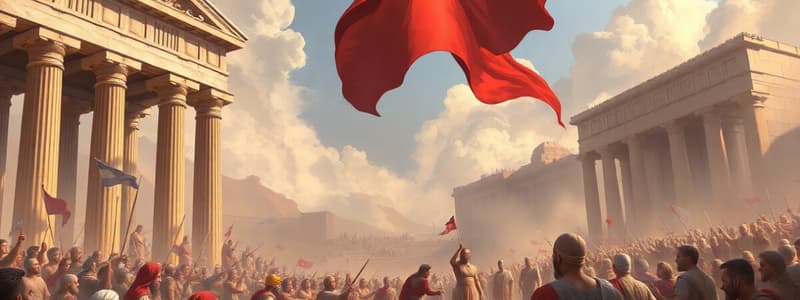Podcast
Questions and Answers
What marked the beginning of the Peloponnesian War?
What marked the beginning of the Peloponnesian War?
- Active hostilities beginning in 460 BCE (correct)
- The formation of the Delian League
- The signing of the 30 Years' Peace treaty in 446 BCE
- The defeat of Athens in 404 BCE
Who is considered the main source for the history of the Peloponnesian War?
Who is considered the main source for the history of the Peloponnesian War?
- Thucydides (correct)
- Plato
- Herodotus
- Xenophon
What was the purpose of the 30 Years' Peace treaty?
What was the purpose of the 30 Years' Peace treaty?
- To signify the end of all Greek wars
- To establish a lasting alliance between Athens and Sparta
- To propose an end to hostilities between the poles (correct)
- To officially dissolve the Delian League
In what year were the Athenians defeated in the Peloponnesian War?
In what year were the Athenians defeated in the Peloponnesian War?
Which of the following accurately describes Thucydides' background?
Which of the following accurately describes Thucydides' background?
What event led to Thucydides’ exile?
What event led to Thucydides’ exile?
What feature of Thucydides’ style refers to the unique sound of his prose?
What feature of Thucydides’ style refers to the unique sound of his prose?
Which best describes Thucydides’ approach to writing history?
Which best describes Thucydides’ approach to writing history?
How does Thucydides’ approach to history differentiate from that of poets?
How does Thucydides’ approach to history differentiate from that of poets?
What significant health event did Thucydides experience during the war?
What significant health event did Thucydides experience during the war?
What does Aristotle’s distinction between historians and poets suggest about their purposes?
What does Aristotle’s distinction between historians and poets suggest about their purposes?
What term describes a ruler who seizes control of an existing government in ancient Greece?
What term describes a ruler who seizes control of an existing government in ancient Greece?
What historical significance is attributed to Thucydides’ work?
What historical significance is attributed to Thucydides’ work?
Which term best describes the period when kingship likely disappeared in Ancient Greece?
Which term best describes the period when kingship likely disappeared in Ancient Greece?
What describes Thucydides' writing style in comparison to traditional historical accounts?
What describes Thucydides' writing style in comparison to traditional historical accounts?
What feature of Thucydides’ historical methodology distinguishes him from earlier historians like Herodotus?
What feature of Thucydides’ historical methodology distinguishes him from earlier historians like Herodotus?
What major shift does Thucydides represent in historical writing?
What major shift does Thucydides represent in historical writing?
Which section of Thucydides' work is believed to be the most polished?
Which section of Thucydides' work is believed to be the most polished?
What was the primary goal of the Athenian expedition to Sicily?
What was the primary goal of the Athenian expedition to Sicily?
What was Thucydides' methodology for reporting speeches in his history?
What was Thucydides' methodology for reporting speeches in his history?
How does Thucydides' narrative style compare to the speeches in his history?
How does Thucydides' narrative style compare to the speeches in his history?
What historical context triggered the Athenian expedition to Sicily?
What historical context triggered the Athenian expedition to Sicily?
What notable speech did Thucydides report that is famous for its depth and significance?
What notable speech did Thucydides report that is famous for its depth and significance?
What does the phrase 'two hearts beat in Thucydides’ breast' refer to?
What does the phrase 'two hearts beat in Thucydides’ breast' refer to?
What is a defining characteristic of oligarchy as described in the content?
What is a defining characteristic of oligarchy as described in the content?
Which form of government allows all citizens to participate in decision making directly?
Which form of government allows all citizens to participate in decision making directly?
What does the term 'eleutheria' signify in the context of Athenian democracy?
What does the term 'eleutheria' signify in the context of Athenian democracy?
Who amongst the following criticized Athenian democracy, according to the content?
Who amongst the following criticized Athenian democracy, according to the content?
What was a significant factor that limited the democratic citizenship in Athens?
What was a significant factor that limited the democratic citizenship in Athens?
Which term describes the concept of 'rule by the few' in the context of governance?
Which term describes the concept of 'rule by the few' in the context of governance?
What was a major criticism of Athenian democracy by its opponents?
What was a major criticism of Athenian democracy by its opponents?
Who was a notable tyrant in Athens before the establishment of democracy?
Who was a notable tyrant in Athens before the establishment of democracy?
What was the main goal of Cleisthenes' reforms?
What was the main goal of Cleisthenes' reforms?
What was the purpose of the system of ostracism in Athenian democracy?
What was the purpose of the system of ostracism in Athenian democracy?
How many tribes were established in the region of Attica under Cleisthenes' reforms?
How many tribes were established in the region of Attica under Cleisthenes' reforms?
Who were excluded from political rights in ancient Athenian democracy?
Who were excluded from political rights in ancient Athenian democracy?
What was the role of the Boule in Athenian democracy?
What was the role of the Boule in Athenian democracy?
What voting method was used for ostracism in ancient Athens?
What voting method was used for ostracism in ancient Athens?
At what age did Athenian men receive full political rights?
At what age did Athenian men receive full political rights?
What happened to the Peisistratids after Pisistratus' rule?
What happened to the Peisistratids after Pisistratus' rule?
Flashcards
The Peloponnesian War
The Peloponnesian War
A war between Athens and Sparta that began in 460 BCE and lasted until 404 BCE, when Athens was defeated.
The Delian League
The Delian League
A coalition of Greek city-states, led by Athens, formed after the Persian Wars.
30 Years' Peace
30 Years' Peace
A 30-year peace treaty between Athens and Sparta, which was supposed to end hostilities in 446 BCE. Interestingly, it only lasted 15 years.
The Greater Peloponnesian War
The Greater Peloponnesian War
Signup and view all the flashcards
Thucydides
Thucydides
Signup and view all the flashcards
Demagogue
Demagogue
Signup and view all the flashcards
Pericles
Pericles
Signup and view all the flashcards
The Plague of Athens
The Plague of Athens
Signup and view all the flashcards
Parts of Thucydides' History
Parts of Thucydides' History
Signup and view all the flashcards
Shifting from Oral to Literary Tradition
Shifting from Oral to Literary Tradition
Signup and view all the flashcards
Thucydides' Goal
Thucydides' Goal
Signup and view all the flashcards
Athenian Expedition to Sicily
Athenian Expedition to Sicily
Signup and view all the flashcards
Speeches in Thucydides' History
Speeches in Thucydides' History
Signup and view all the flashcards
Reconstruction of Speeches
Reconstruction of Speeches
Signup and view all the flashcards
Narrative vs. Speeches
Narrative vs. Speeches
Signup and view all the flashcards
Two Hearts Beating Within Thucydides
Two Hearts Beating Within Thucydides
Signup and view all the flashcards
Thucydides' Style
Thucydides' Style
Signup and view all the flashcards
Thucydides' Historical Approach
Thucydides' Historical Approach
Signup and view all the flashcards
Thucydides' Purpose
Thucydides' Purpose
Signup and view all the flashcards
Kingship
Kingship
Signup and view all the flashcards
Tyranny
Tyranny
Signup and view all the flashcards
Athenian Democracy
Athenian Democracy
Signup and view all the flashcards
Aristotle's View of Historians vs. Poets
Aristotle's View of Historians vs. Poets
Signup and view all the flashcards
Stasis
Stasis
Signup and view all the flashcards
Oligarchy
Oligarchy
Signup and view all the flashcards
Athenian Democratic Ideology
Athenian Democratic Ideology
Signup and view all the flashcards
Freedom of Speech in Athenian Democracy
Freedom of Speech in Athenian Democracy
Signup and view all the flashcards
Equality in Athenian Democracy
Equality in Athenian Democracy
Signup and view all the flashcards
Direct Democracy
Direct Democracy
Signup and view all the flashcards
Representational/Parliamentary Democracy
Representational/Parliamentary Democracy
Signup and view all the flashcards
Classical vs. Modern Democracy
Classical vs. Modern Democracy
Signup and view all the flashcards
510 BCE: Expulsion of the Pisistratids
510 BCE: Expulsion of the Pisistratids
Signup and view all the flashcards
Cleisthenes' Reforms
Cleisthenes' Reforms
Signup and view all the flashcards
Council of 500 (Boule)
Council of 500 (Boule)
Signup and view all the flashcards
Ostracism
Ostracism
Signup and view all the flashcards
Political Organization of Attica
Political Organization of Attica
Signup and view all the flashcards
Metics (Metoikoi)
Metics (Metoikoi)
Signup and view all the flashcards
Athenian Political Rights
Athenian Political Rights
Signup and view all the flashcards
Citizenship in Athens
Citizenship in Athens
Signup and view all the flashcards
Demes
Demes
Signup and view all the flashcards
Study Notes
The Peloponnesian War
- The Peloponnesian War, named after the Peloponnesus, was a conflict between Athens and Sparta.
- The war began in 460 BCE and ended in 404 BCE.
- A 30-year peace was proposed in 446 BCE, but only lasted 15 years.
- This conflict divided into two phases: The Greater Peloponnesian War (431-404 BCE)
- Thucydides, a prominent figure in political science, documented the war.
- Thucydides held the position of general in 424 BCE and likely died around 400 BCE.
Thucydides
- Was an Athenian general and author of a historical record of the Peloponnesian War.
- He was elected as an Athenian general in 424 BCE, indicating his age to be at least 30 at the time.
- Thucydides wrote an account of the plague of Athens (430-427 BCE).
- He was exiled in 424 BCE after failing to secure Amphipolis.
Athenian Democracy
- The origin of democracy dates back to Classical Athens.
- Forms of ancient Greek government included monarchy, tyranny, and oligarchy
- King, typically a ruler by heredity, held power in earlier times.
- Athenian democracy, though not truly equal, granted citizens participation in government.
- Athenian democracy was essentially a direct form where citizens voted on laws and major issues.
Athenian Democracy, Ideology and Institutions
- Democracy, or rule by the people, was a hotly debated form of government.
- Critics argued that it was often dominated by the poor and unqualified.
- A core feature was freedom of speech
- The Assembly (ekklesia), a large gathering of citizens, was the primary decision-making body
- Citizens in ancient Athens were mostly men. Women, slaves, and foreigners did not have voting rights
- Athenian citizenship was typically hereditary
Studying That Suits You
Use AI to generate personalized quizzes and flashcards to suit your learning preferences.




